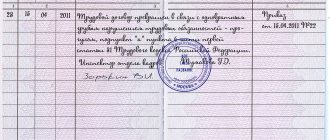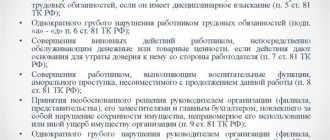If your employer fired you without warning, without legal grounds, do not despair. In this article we will suggest ways to solve this problem. To dismiss an employee, there must be grounds expressly provided for by the Labor Code of the Russian Federation, and the dismissal procedure must be followed. In case of any of these violations, the employee can be reinstated in his job. Even those employees with whom employers have not formalized an employment relationship have the right to protect their interests. The main thing is not to put up with the current situation and go towards your goal to the end.
Can an employer fire without cause?
Labor legislation contains many different guarantees of the labor rights of workers. Such guarantees include, among other things, a ban on dismissing employees without any reason. All grounds on which employees can be dismissed are directly provided for by the Labor Code of the Russian Federation.
In general, they can be divided into dismissals:
- At the request of the employee;
- At the request of the employer.
Any dismissal of an employee must be justified and legal. The employer is obliged to comply with the dismissal procedure provided for by the current legislation of the country.
Dismissal without reason, as well as dismissal in violation of the procedure established by law, can be appealed by the employee in court.
Dismissal at your own request
Each employee can submit a resignation letter at any time of his own free will. He must do this 2 weeks before the expected date of dismissal. The employer does not have the right to unilaterally reduce these terms and dismiss an employee before their expiration. The fact is that during these 2 weeks the employee has the right to change his mind and withdraw his application. This means that his early dismissal will be a violation of this right.
Attention! The two-week warning period can be reduced by mutual agreement of the employee and employer.
Dismissal at the initiative of the employer (Article 81 of the Labor Code of the Russian Federation)
All the grounds on which the employer has the right to dismiss employees on his own initiative are expressly provided for in Art. 81 Labor Code of the Russian Federation. They can be divided into 2 types:
- Dismissals related to illegal acts of an employee (for example, failure to perform work duties, absenteeism, showing up at work while drunk, etc.);
- Dismissals not related to illegal acts of the employee (for example, liquidation or termination of the employer, staff reduction).
Each case has its own dismissal procedure. So, for example, upon dismissal due to staff reduction, the employer is obliged to notify the dismissed employees 2 months in advance, with payment of certain compensation to them. And if an employee is dismissed for committing an unlawful act, an investigation must be carried out with its results recorded in the report.
The law provides for cases when employers do not have the right to fire their employees at all. Such cases include, but are not limited to:
- Dismissal of an employee while he is on sick leave or on vacation;
- Dismissal of a pregnant employee, or an employee on maternity leave, etc.
It might be interesting!
What to do if the employer does not pay upon dismissal?
When does an employer have the right to fire an employee without notice?
Notification of dismissal in advance is not necessary in the following situations:
- submission of false documents during employment;
- not suited for the position, failure of certification;
- systematic violation of the employment contract;
- gross failure to fulfill official duties (absenteeism, appearing drunk, theft, disclosure of trade secrets, violation of labor safety rules, which led to an accident or accident);
- immoral act (for workers in the educational and pedagogical sphere);
- loss of trust as a result of harm.
The manager, deputy director, or chief accountant can be dismissed without warning by higher management when the owner of the organization changes. Dismissal without notice is permitted if the chief accountant or manager made an erroneous decision that resulted in damage to the owner of the company.
Unilateral dismissal by an employer in case of unofficial employment
In most cases, employers allow themselves to dismiss employees without reason and without advance warning if these employees are employed informally. They mistakenly believe that workers in this case will not be able to protect their rights, since they do not have properly executed documents in their hands.
At the same time, the law allows such employees to recognize in court the fact of the existence of an employment relationship with a specific employer and be reinstated to work even without an employment contract and book.
As evidence of work activity, the courts accept any documents by which the specified fact can be reliably proven, for example, pay slips, employee statements endorsed by the manager, assignments from management, reports on work performed, correspondence, witness statements, recordings from CCTV cameras and others proof.
Contacting the State Tax Inspectorate and the Prosecutor's Office
An illegally dismissed employee may file a complaint with the State Tax Inspectorate and the prosecutor's office. This can be done at the same time. Applications are drawn up in any form, and, in principle, can be almost identical.
Such statements must contain:
- The name of the body to which it is addressed;
- Full name, place of work, contacts and address of the applicant;
- Circumstances of the case, including information about the concluded employment contract, illegal dismissal and other violations by the employer;
- Request to conduct an inspection and eliminate the violation of the employee’s rights;
- Employee signature;
- Date of.
How can you challenge illegal dismissal?
If there is a conflict situation at work (the employer forces you to quit), it is useful to know what the employee should do first:
- Consider whether it is worth keeping your job. Even if the dismissal is clearly illegal, working in a state of “hidden conflict” is uncomfortable.
- Carefully record all negotiations with the manager, monitor the employer’s actions, and, if possible, anticipate provocations.
- Do not sign any documents that may be related to dismissal.
- Try to perform your duties with special care.
- Avoid any violations of labor discipline, including being 5–10 minutes late.
However, if the dismissal has already taken place, the employee must recognize it as illegal. To do this, you should collect the maximum amount of evidence of the employer’s guilt, and then file a complaint with the labor inspectorate or file a lawsuit.
Evidence of the employer's guilt
The guilt of the manager or other officials can be substantiated only with the presentation of appropriate written and material evidence. The labor inspectorate, and especially the court, will not be able to accept the applicant’s position “on faith.” Such evidence may include:
- manager's order;
- job descriptions;
- progress reports;
- office notes;
- statements in which the employee signed or did not sign;
- audio, video recordings;
- photographs, screenshots of correspondence, emails;
- witness testimony (also in writing).
Filing a complaint to the labor inspectorate
You can challenge your dismissal by filing a complaint with the labor inspectorate. The application is drawn up in any form, but it must reflect:
- name of the organization, its address, full name of the director;
- your full name, address and contact details;
- describe the essence of the dispute over the dismissal, indicate the reasons why it should be declared illegal;
- a request for reinstatement, payment of compensation, application of liability measures to the employer;
- appendices – list of documents and materials;
- date, signature with explanation (last name, initials).
The application must be accompanied by the evidentiary materials listed above, as well as the following documents:
- employment contract;
- employment history;
- The order of acceptance to work;
- dismissal order;
- certificate of average salary;
- a certificate of employment with a description of the employee’s position;
- reference from the employer (if available).
The inspectorate considers the complaint, conducts an on-site inspection, and then makes a decision. In some cases, an employee can be reinstated even without going to court, but in others the inspector’s decision is not binding. The practice of making decisions on labor disputes related to illegal dismissal depends on the region. Therefore, it is better to clarify this question in advance.
A complaint must be filed with the labor inspectorate no later than 30 days from the date of dismissal. Therefore, you should act as quickly as possible. If the deadline is violated for a good reason (for example, illness), it can be restored if there is appropriate documentary evidence.
Filing a complaint to the prosecutor's office
The prosecutor's office can also organize an unscheduled inspection, the results of which will make a decision on reinstatement after illegal dismissal. Therefore, it is advisable for an employee to contact this institution if:
- The labor inspectorate does not have the authority to reinstate an employee at work.
- The labor inspectorate made an unsatisfactory decision, recognizing the employer’s actions as legal.
The application is drawn up according to the same template. The list of documents that need to be attached is also the same.
Going to court
An employee is given only one month to file a claim for reinstatement at work, so it is recommended not to delay time and to file a claim as early as possible. Such disputes are considered in district courts at the employer’s location.
The statement of claim must contain:
- Name of the court;
- Information about the parties and the plaintiff’s representative (if any);
- The circumstances of the case;
- Confirmation of the described circumstances;
- Requirements to the court;
- List of documents;
- Signature;
- Date of.
In the statement of claim, in addition to the demand for reinstatement at work, the employee has the right to demand payment of his salary for the entire period of forced downtime, as well as compensation for moral damage. Along with the application, you must submit to the court documents confirming the information specified in it.
Therefore, as stated above, employees should not accept violations of their rights, including wrongful dismissal. If you contact the appropriate authorities in a timely manner, the dismissal will be canceled and the employee will be able to continue working in the same place.
It might be interesting!
Can a pensioner resign without working?
What measures should be taken to protect rights in case of illegal dismissal?
An employee fired with violations does not always understand what to do. The employer will have serious problems if a former subordinate files a complaint with such authorities as:
- State Labor Inspectorate (SIT);
- prosecutor's office;
- district court.
After accepting the application, a verification of the dismissal documentation is organized. The employer will be required to pay a fine for violating labor standards, as well as the wages of the victim for the period of forced downtime. All three authorities can be contacted simultaneously, as they use different methods of work. The State Tax Inspectorate and the prosecutor initiate an inspection, fine them, and issue orders to eliminate violations.
A lawsuit allows you to be reinstated at work and request compensation for downtime. The statement of claim is submitted within 30 days from the date of receipt of the work record book or order. If the employee did not receive the order, the period is counted from the moment he received information about the illegal dismissal.
Questions for a labor expert:
The employer fired without warning by telegram
Natalia
Labor expert
Question to the expert
Hello! I work as a merchandiser in the city of Tula. The organization in which I am registered is located in Moscow. The employment contract states that statements, notices and warnings must be sent by telegram to the parties. One working day, I received funds from my employer on my card. When I called back to the accounting department to clarify what the transfer was for, they told me that it was a calculation, since I was fired. At the same time, I did not receive any warning by telegram. What to do in such a situation?
Hello! I recommend that you contact the district court at the employer’s location with a statement of claim for reinstatement at work, payment of your salary for the entire period of forced downtime, as well as compensation for moral damage. The defendant, that is, the employer, is required to prove the legality of the dismissal, as well as to properly notify you of the upcoming dismissal.
Employer's liability for illegal dismissal
If the fact of illegal dismissal is recognized by a court decision, the employer will not only be obliged to reinstate the employee in his position, but will also be fined or take more serious penalties.
| Category | Fine, rub. | Other measures |
| executive | 1000-5000 | not provided |
| IP | 1000-5000 | temporary ban on activities (up to 90 days) |
| entity | 30000-50000 |
Moreover, in accordance with Art. 394 of the Labor Code the following legal consequences occur:
- The employee is paid his entire salary from the date of dismissal until the day the decision comes into force.
- He has the right to count on compensation for moral damages for illegal dismissal (the amount is determined by the court, as a rule, it is insignificant).
- If the court finds the dismissal legal, but on a different basis, the wording must be changed. Moreover, the date of dismissal is determined as the date of the court decision (and not the original one, according to the work book).
The only case of criminal liability is related to the dismissal of a pregnant woman or a woman who has a child under 3 years of age. In accordance with Art. 145 of the Criminal Code, the offender may pay a fine of up to 200 thousand rubles or in the amount of the salary received for up to 18 months, or be sent to compulsory work for a period of 120–180 hours.









